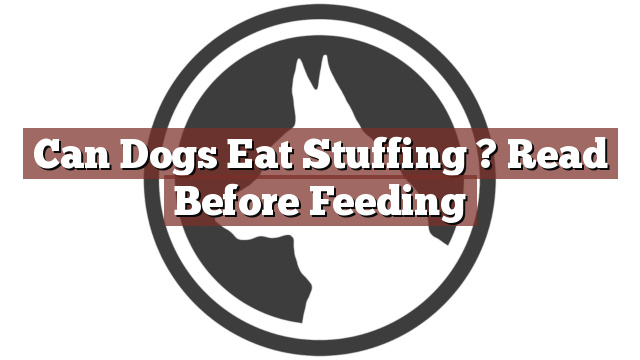Understanding Your Dog’s Dietary Needs
As responsible pet owners, it is crucial for us to understand our dog’s dietary needs in order to provide them with a healthy and balanced diet. Dogs are omnivores, which means they can consume a variety of foods including meat, vegetables, and grains. However, not all human foods are safe for dogs to consume. It is important to be aware of the potential risks and benefits before introducing any new food into your dog’s diet.
Can Dogs Eat Stuffing? Read Before Feeding
Can dogs eat stuffing? This is a common question that pet owners often ask themselves, especially around the holiday season when stuffing is a popular dish. The answer to this question is no. While stuffing may be delicious for us, it can be harmful to our furry friends.
Stuffing typically contains a variety of ingredients, including onions, garlic, and spices, which can be toxic to dogs. Onions and garlic, in particular, contain compounds that can cause damage to a dog’s red blood cells, leading to anemia. Moreover, the high fat content in stuffing can cause digestive issues such as pancreatitis, which can be painful and potentially life-threatening for dogs.
Pros and Cons of Feeding Stuffing to Your Dog
Feeding stuffing to your dog may seem like a harmless treat, but it is important to consider the potential risks involved. On the positive side, stuffing may provide some dietary variety and a flavorful taste for dogs. However, the risks associated with feeding stuffing outweigh the benefits.
One potential benefit of stuffing is that it can contain vegetables such as carrots or celery, which provide essential vitamins and minerals. However, it is important to note that these vegetables can be served to dogs in a safer and more suitable form, such as lightly steamed or raw. This way, your dog can still enjoy the nutritional benefits without the risks associated with stuffing.
Conclusion
In conclusion, it is best to avoid feeding stuffing to your dog. The potential risks, including toxic ingredients and high fat content, outweigh any potential benefits. It is always important to prioritize your dog’s health and well-being by providing them with a balanced diet that meets their specific dietary needs. If you are unsure about whether a specific food is safe for your dog to consume, it is always recommended to consult with your veterinarian for professional advice. Remember, a healthy and happy dog starts with a proper diet.
Thank you for taking the time to read through our exploration of [page_title]. As every dog lover knows, our furry friends have unique dietary needs and responses, often varying from one canine to another. This is why it's paramount to approach any changes in their diet with caution and knowledge.
Before introducing any new treats or making alterations to your dog's diet based on our insights, it's crucial to consult with a veterinarian about [page_title]. Their expertise ensures that the choices you make are well-suited to your particular pet's health and well-being.
Even seemingly harmless foods can sometimes lead to allergic reactions or digestive issues, which is why monitoring your dog after introducing any new food item is essential.
The content provided here on [page_title] is crafted with care, thorough research, and a genuine love for dogs. Nevertheless, it serves as a general guideline and should not be considered a substitute for professional veterinary advice.
Always prioritize the expert insights of your veterinarian, and remember that the health and happiness of your furry companion come first.
May your journey with your pet continue to be filled with joy, love, and safe culinary adventures. Happy reading, and even happier snacking for your canine friend!

